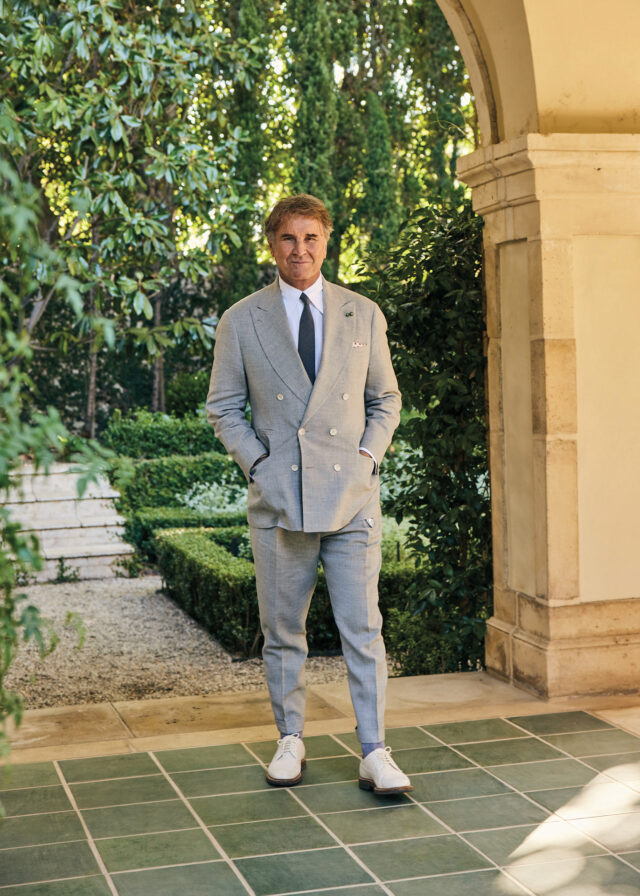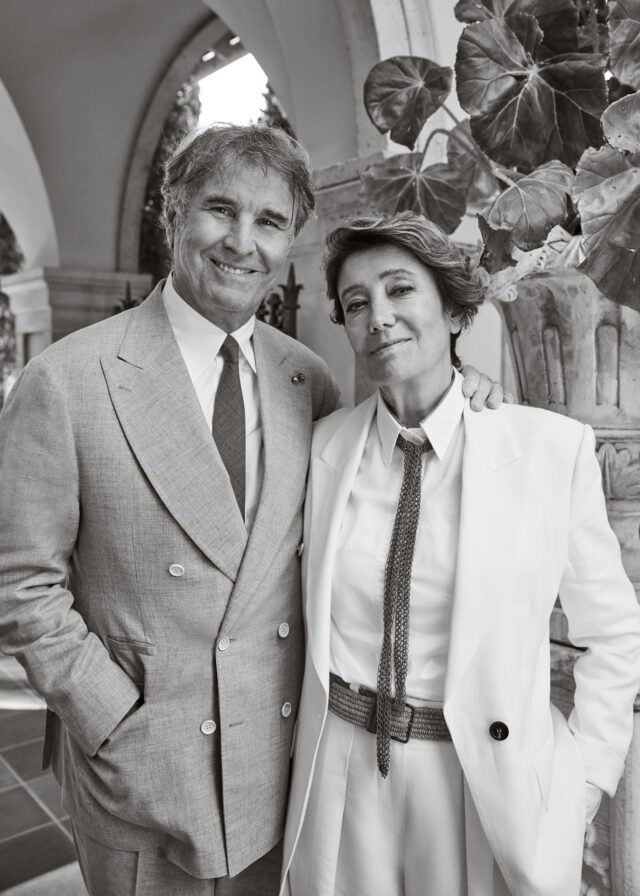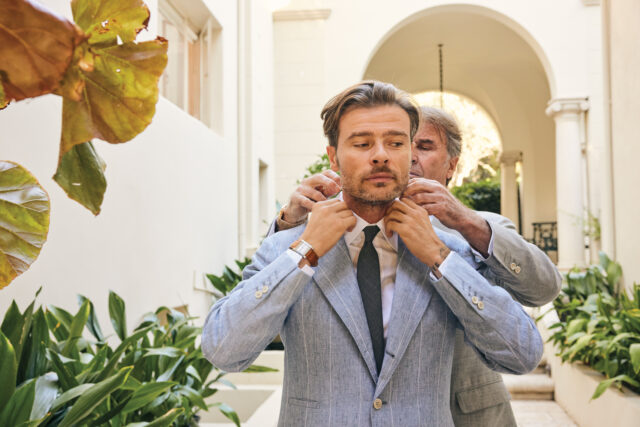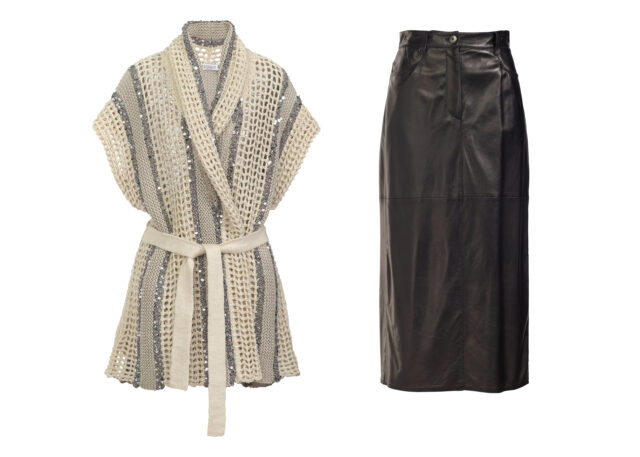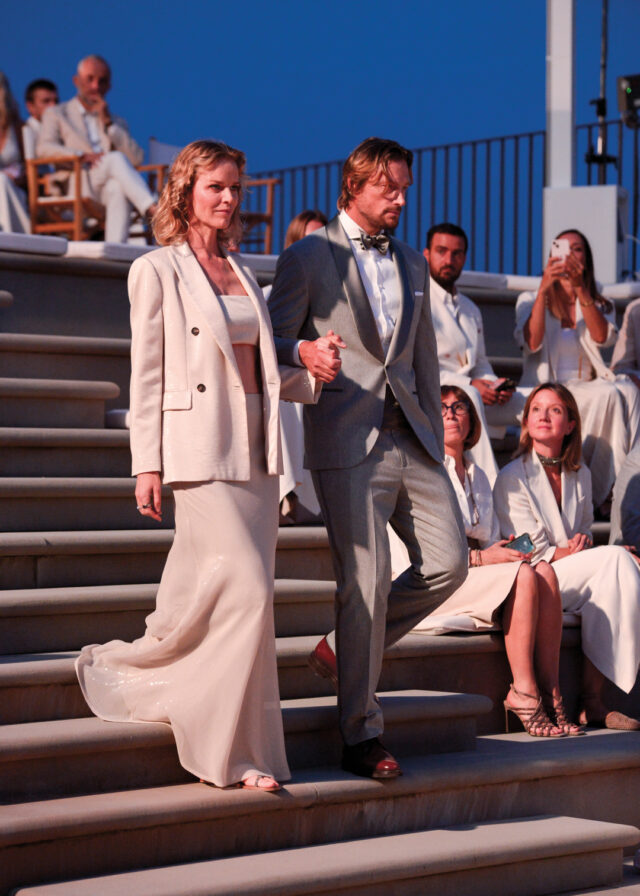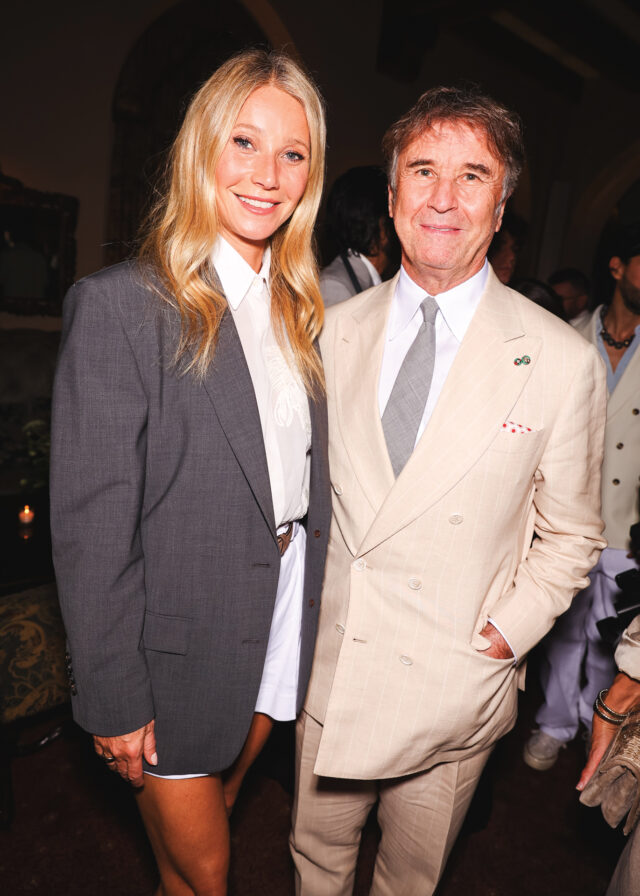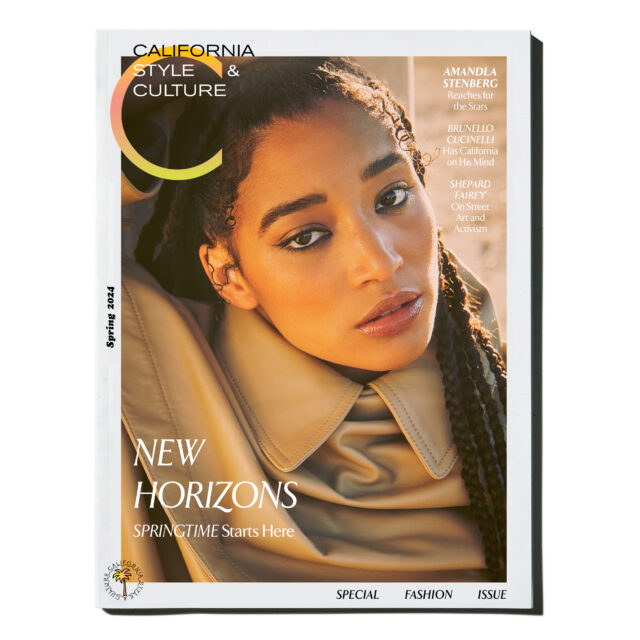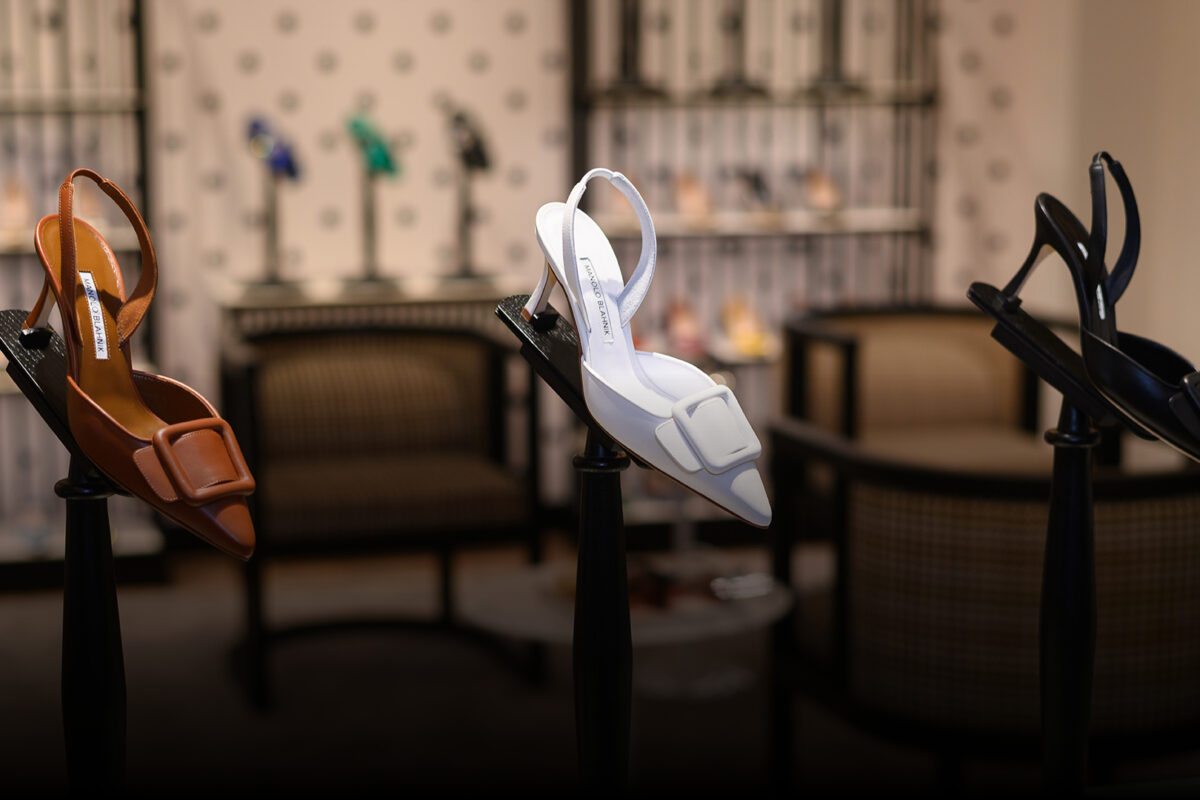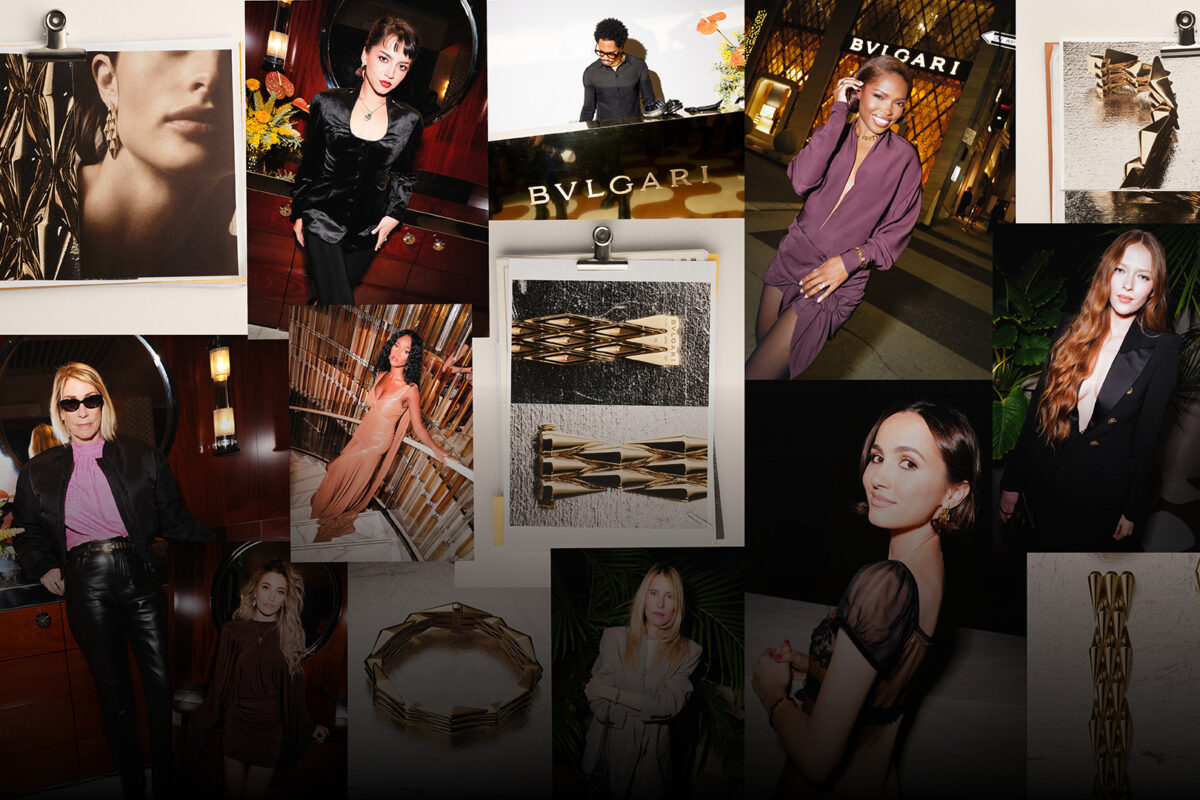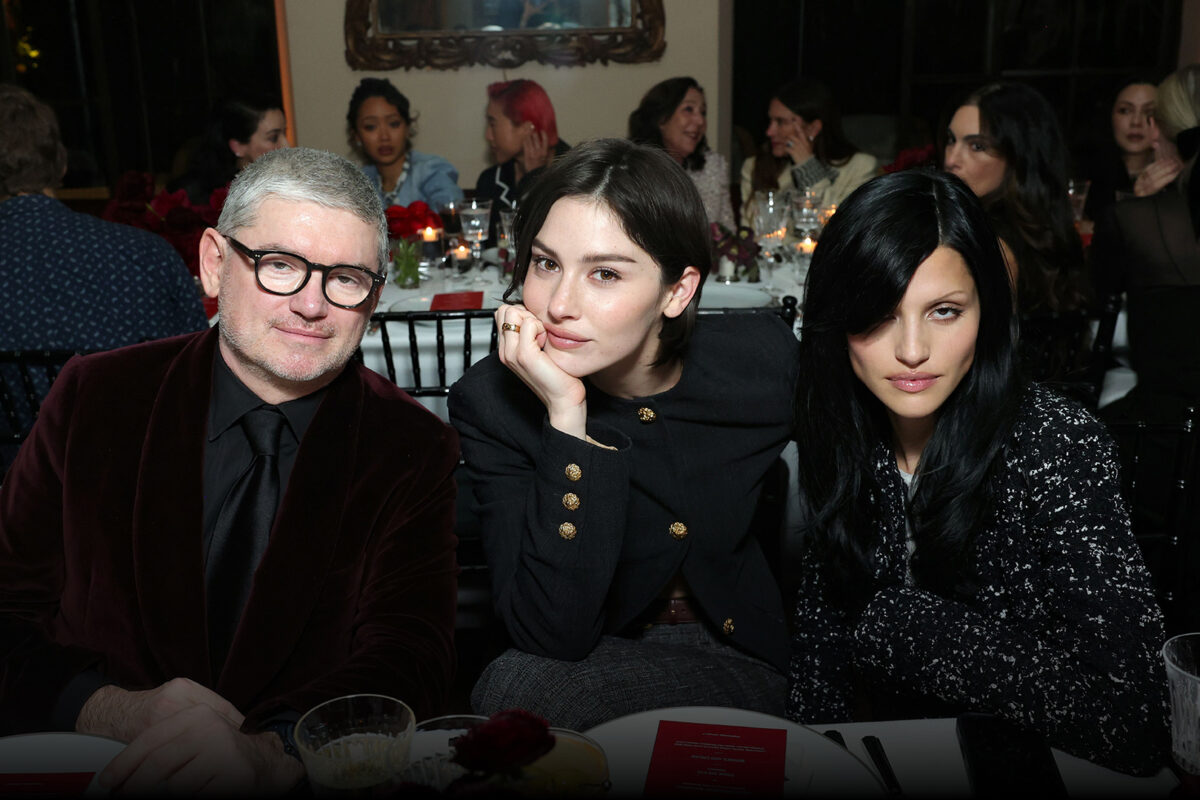Having charmed Hollywood’s leading lights and Silicon Valley’s brightest minds with his unique brand of casual elegance, the founder shares how the Golden State captured his heart
Photography by SAMI DRASIN
Words by MAX BERLINGER
Brunello Cucinelli, the dapper, philosophy-minded paterfamilias of the brand that bears his name, in California late last year.
Designer Brunello Cucinelli has built his brand on a certain idea of modern Italian living, and in many ways he is the embodiment of it. This incarnation was on full display one morning in New York last fall, where he was splayed on a sumptuous sofa at Casa Cucinelli, his private showroom for the type of VIP client who prefers not to step inside a store. Cucinelli, 70, was elegantly rumpled in earthy shades of beige and cream, his skin sun-kissed, his hair a little shaggy in that effortless Italian way. As he sipped a coffee and spoke in animated fashion through a smartly dressed interpreter, members of his family — many of whom work at the brand — chimed in, overlapping and laughing in unison. Around him were racks of sophisticated yet relaxed garments, from insouciant suiting to downy knitwear with just a touch of flamboyance (festive plaids for men or a hint of sparkle for women). His designs constitute an evolving wardrobe with the well-traveled and high-net-worth in mind, which has made him as wealthy as those who can afford his wares. For the Cucinellis, it’s always la dolce vita.
“Every year we have a Thanksgiving in Solomeo, where I live, for the Americans,” Cucinelli says through his interpreter, grinning. Although he won’t reveal who shows up, he does note that Gwyneth Paltrow and Ryan Seacrest own properties nearby. “It’s an open invitation, and anyone who’s there can come. And my wife cooks because she’s never happy with someone else’s cooking — and it’s a dinner for 50!” His wife, Federica, has mastered the turkey, but the family says they’re still working on finessing the desserts, specifically the pies. “We should invite Martha Stewart,” Carolina, his youngest daughter, says. Everyone nods in agreement. When you’re with the Cucinellis, this idea doesn’t seem so farfetched: Stewart was a guest at Cucinelli’s 70th birthday party last summer, where 400 guests feasted on paccheri al pomodoro and drank the first reds from his new vineyard.
Lately Cucinelli has been thinking a great deal about America — specifically, California. Days after our chat, he hosted an intimate candlelit dinner party at the Chateau Marmont, which in a certain light resembles a sprawling Italian villa. There he held court for Hollywood heavyweights, including Jennifer Lopez, Ben Affleck, Chris Pine, Gwyneth Paltrow, and Oprah Winfrey. The brand, after all, has a strong following in California given its retail presence, which extends from San Francisco to South Coast Plaza via Rodeo Drive (Beverly Hills also has its own Casa Cucinelli). In 2021, it opened at Rosewood Miramar Beach in Santa Barbara, the brand’s first location at a hotel property and a one-stop shop for Montecito’s well-heeled admirers of his soft and cocooning garments — a crowd that knows all too well that the ultimate luxury is to be comfortable.
Cucinelli with his wife, Federica. They run the Brunello and Federica Cucinelli Foundation and the Foro della Arti, which promote the arts and preserve architecture in Solomeo, Italy, where they live and work.
Just last year, as industry insiders started promoting the idea of quiet luxury — clothes that were opulent yet subtle, as seen on the California-based episodes of the final season of Succession (and an about-face reaction to the flashy maximalism of certain other Italian houses) — they pointed to Brunello Cucinelli as a lodestar of the movement. Not that the family paid much mind; they were just doing what he’d been doing for years. The world, it seemed, had caught up. “I use California for research,” he says. “Especially the summer collections. I get a lot of inspiration there.”
Cucinelli has more than just a commercial grip on the Golden State; he has a somewhat psychic hold on it as well. His clothing — decadent yet subtle, unassuming to the eye yet downright opulent to the touch — feels particularly attuned to the lives of the monied but notoriously casual West Coasters. The brand has become something of a known secret among movie stars, their minders, and, further north, tech entrepreneurs. Mark Zuckerberg famously favors the gray T-shirts, and Salesforce CEO Marc Benioff is a noted devotee. In 2019, when Cucinelli beckoned a smattering of Silicon Valley elite — men like Jeff Bezos, LinkedIn cofounder Reid Hoffman, and former Twitter CEO Dick Costolo — to his hillside castello to talk business, they did just that. At the time, he called them “the Leonardos of the 21st century.”
“The future of fashion is chic, elegant, dapper clothes, like ‘The Great Gatsby’”
brunello cucInelli
Cucinelli with his son-in-law, Alessio Piastrelli, who is on the board of directors and is married to Carolina Cucinelli.
There’s also a personal connection to California. Carolina, who serves as the brand’s copresident and co–creative director, recently bought a house in Los Angeles, which is being renovated. She declines to call it her home because Solomeo, the Umbrian village where her parents reside and the business is based, is her terra patria. But she recalls being seduced by the state a decade ago as she drove along the coastline, drinking in all it has to offer. “I could not help but notice the similarities with some areas of Italy — the vineyards, the rocky coastline, and the sense of community in each city,” she says.
The resemblance doesn’t end at topography. She noted a certain way of living that Californians share with Italians. “The sense of freedom, the creativity of the movie industry, the art and the style conveyed by everyone; the cultural melting pot of people who come to L.A. from all over the world and the typical flavor of local music, as well as Hollywood,” she explains.
“I feel so at home when I arrive in L.A.,” she says. “Our collection is suitable for people who live in a climate like California’s. It suits both leisure and office wear. If you live in California, you might start the day with a light blazer, wear a T-shirt in the afternoon, and then add a cashmere sweater underneath your blazer. This ability to mix colors and layers is key to the Cucinelli aesthetic.”
BRUNELLO CUCINELLI cardigan, $5,300, and skirt, price upon request.
Indeed, part of Brunello’s success was his farsighted approach to blend the business acumen of an Italian industrialist with the laid-back ethos of the West Coast. This is, no doubt, partly the result of his upbringing. Cucinelli grew up the son of a sharecropper, without electricity and deeply connected to the rhythms of the land. At 15, he and his family moved to a nearby city, where his father started to work in a factory. Young Cucinelli discovered the philosophical teachings of Plato, Socrates, and Epicurus after hearing university students debating at a café. He has been obsessed with the humanities ever since, and he quotes ancient philosophers with alarming frequency. “I was struck by something Kant once said,” he tells me while remembering those heady days in the café, watching the students argue. “‘Two things move me: the stars in the sky above me and the moral law inside me.’ This is precisely what my father used to say, that you must be a good man, which means you need to have your moral law inside you.”
These tenets have greatly influenced Cucinelli as he built his company into a global enterprise. It’s been a long time since he borrowed a small sum in 1978 to weave a few plush cashmere sweaters in bold colors (as opposed to the reserved neutrals popular in the day), which immediately sold out. Since then, his business has grown into a full-fledged multibillion-dollar lifestyle brand encompassing relaxed tailoring and spiffy sportswear for men and refined yet easy dresses and smart separates for women. He has just launched his first fragrances for him and her, and next up will be eyewear following a successful partnership with Oliver Peoples.
But it’s not merely what Cucinelli makes that fascinates and excites fans, but how he makes it. Today he may oversee many hundreds of employees, but he approaches his business with the heart of a farmer-turned-philosopher, creating garments made from natural fibers and made by craftspeople who are paid and treated well and work in the best of conditions. He calls this “humanistic capitalism”: a way to honor people, products, and profits.
“Capitalism is under change. It needs to be in step with the times”
BRUNELLO cucInelli
Models at Brunello Cucinelli’s 70th birthday celebration.
“I think capitalism is under change,” he says. “Like everything else. Capitalism needs to be contemporary, in step with the times. Youth, especially, they want to know exactly how much you make, your profit — if it’s ridiculous or if it crosses the line.”
“My aim was to have an ordinary kind of business,” he adds. “And make an ordinary kind of profit. And respect everything around me, nature and human beings.” It may sound specious for someone who sells outerwear that can set you back five figures, but there’s a reason he was asked to present these ideas to world leaders at the G20 summit in 2021. It seems that Cucinelli has become something of a philosopher king of the business world. “We need to find a human side to capitalism,” he says. “Of course there needs to be an economic side, but they have to coexist with the same kind of purpose.”
Cucinelli walks the walk, which can be best seen in the tiny town of Solomeo, where much of his company is based and where he interacts with his employees daily. It’s not uncommon for him to watch soccer matches or dine with his colleagues. In 2010, he and his wife founded the Brunello and Federica Cucinelli Foundation and the Foro della Arti, philanthropic ventures that seek to apply the ideas of those revered philosophical greats to modern life. The foundation is based on Epicurus’ Letter on Happiness, and it seeks to invest in community-based, beauty-seeking projects that will improve the lives of his workers, such as promoting arts and culture (like Solomeo’s spectacular library and the teatro that hosts performances), protecting and maintaining historic architecture, and safeguarding the natural world.
“I’ve always loved things having to do with the above,” he says. “Lofty things. That’s how I spend my evenings. I was reading just the other day — I think it was Plato — that you have to use philosophy throughout your life to prepare for death. And still, today, that’s the kind of life I lead. I don’t watch too much TV and I take a lot of strolls. And look at my phone — no messages! I spend a lot of my time thinking. I have a big fireplace at my house…it’s a former villa from the 16th century, and I just sit there and my wife will come in and say, ‘What are you doing?’ And I say I’m looking at the flames.”
I ask Cucinelli what he thinks of the future of fashion, and he predicts a return to formality and joy, much like the way the world emerged from the Spanish flu pandemic of 1919 into the Roaring Twenties. “Chic, elegant, dapper clothes,” he says. “Like The Great Gatsby.” But, as common with Cucinelli, the fashion chatter eventually turns toward headier discussions of his legacy. He talks of Solomeo, and his dedication to preserve it, but also the fact that this town, which is hundreds of years old, even exists at all. That it was built, all those years ago, with eternity in mind.
“I have always worked thinking about eternity,” he says. “Like Marcus Aurelius said, you should plan for eternity but live as if it were the last day of your life.”
Gwyneth Paltrow and Cucinelli at Chateau Marmont.
AMANDLA STENBERG wearing BOTTEGA VENETA.
Feature image: The Cucinelli family is as Italian as they come, but California has been a focus for them of late.
This story originally appeared in the Spring 2024 issue of C Magazine.
Discover more STYLE news.
See the story in our digital edition

